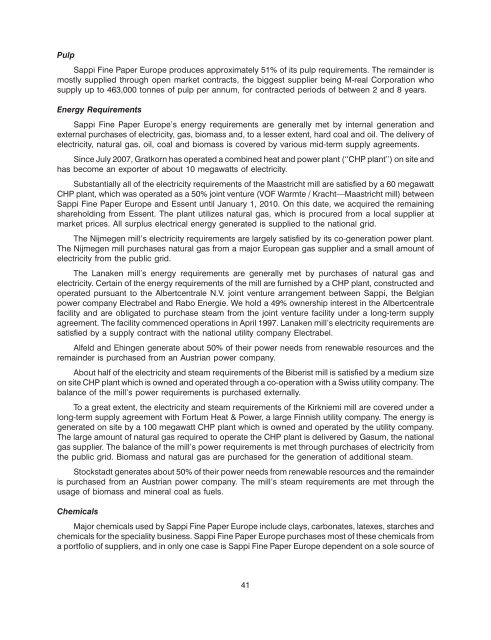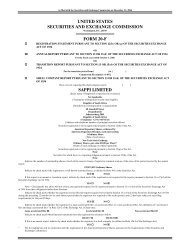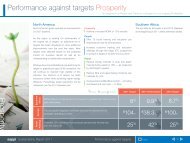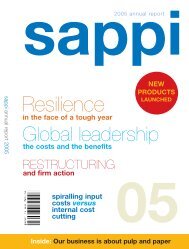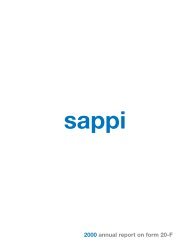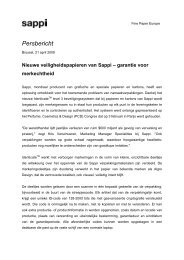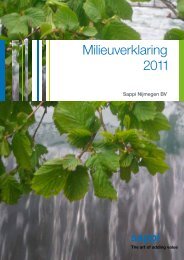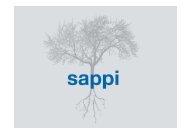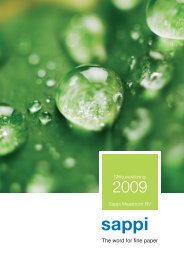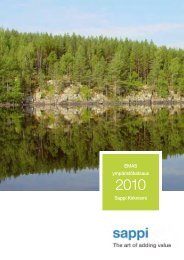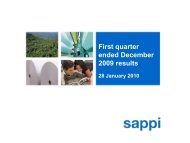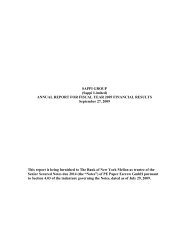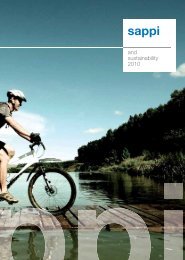Create successful ePaper yourself
Turn your PDF publications into a flip-book with our unique Google optimized e-Paper software.
Pulp<br />
Sappi Fine Paper Europe produces approximately 51% of its pulp requirements. The remainder is<br />
mostly supplied through open market contracts, the biggest supplier being M-real Corporation who<br />
supply up to 463,000 tonnes of pulp per annum, for contracted periods of between 2 and 8 years.<br />
Energy Requirements<br />
Sappi Fine Paper Europe’s energy requirements are generally met by internal generation and<br />
external purchases of electricity, gas, biomass and, to a lesser extent, hard coal and oil. The delivery of<br />
electricity, natural gas, oil, coal and biomass is covered by various mid-term supply agreements.<br />
Since July 2007, Gratkorn has operated a combined heat and power plant (‘‘CHP plant’’) on site and<br />
has become an exporter of about 10 megawatts of electricity.<br />
Substantially all of the electricity requirements of the Maastricht mill are satisfied by a 60 megawatt<br />
CHP plant, which was operated as a 50% joint venture (VOF Warmte / Kracht—Maastricht mill) between<br />
Sappi Fine Paper Europe and Essent until January 1, 2010. On this date, we acquired the remaining<br />
shareholding from Essent. The plant utilizes natural gas, which is procured from a local supplier at<br />
market prices. All surplus electrical energy generated is supplied to the national grid.<br />
The Nijmegen mill’s electricity requirements are largely satisfied by its co-generation power plant.<br />
The Nijmegen mill purchases natural gas from a major European gas supplier and a small amount of<br />
electricity from the public grid.<br />
The Lanaken mill’s energy requirements are generally met by purchases of natural gas and<br />
electricity. Certain of the energy requirements of the mill are furnished by a CHP plant, constructed and<br />
operated pursuant to the Albertcentrale N.V. joint venture arrangement between Sappi, the Belgian<br />
power company Electrabel and Rabo Energie. We hold a 49% ownership interest in the Albertcentrale<br />
facility and are obligated to purchase steam from the joint venture facility under a long-term supply<br />
agreement. The facility commenced operations in April 1997. Lanaken mill’s electricity requirements are<br />
satisfied by a supply contract with the national utility company Electrabel.<br />
Alfeld and Ehingen generate about 50% of their power needs from renewable resources and the<br />
remainder is purchased from an Austrian power company.<br />
About half of the electricity and steam requirements of the Biberist mill is satisfied by a medium size<br />
on site CHP plant which is owned and operated through a co-operation with a Swiss utility company. The<br />
balance of the mill’s power requirements is purchased externally.<br />
To a great extent, the electricity and steam requirements of the Kirkniemi mill are covered under a<br />
long-term supply agreement with Fortum Heat & Power, a large Finnish utility company. The energy is<br />
generated on site by a 100 megawatt CHP plant which is owned and operated by the utility company.<br />
The large amount of natural gas required to operate the CHP plant is delivered by Gasum, the national<br />
gas supplier. The balance of the mill’s power requirements is met through purchases of electricity from<br />
the public grid. Biomass and natural gas are purchased for the generation of additional steam.<br />
Stockstadt generates about 50% of their power needs from renewable resources and the remainder<br />
is purchased from an Austrian power company. The mill’s steam requirements are met through the<br />
usage of biomass and mineral coal as fuels.<br />
Chemicals<br />
Major chemicals used by Sappi Fine Paper Europe include clays, carbonates, latexes, starches and<br />
chemicals for the speciality business. Sappi Fine Paper Europe purchases most of these chemicals from<br />
a portfolio of suppliers, and in only one case is Sappi Fine Paper Europe dependent on a sole source of<br />
41


